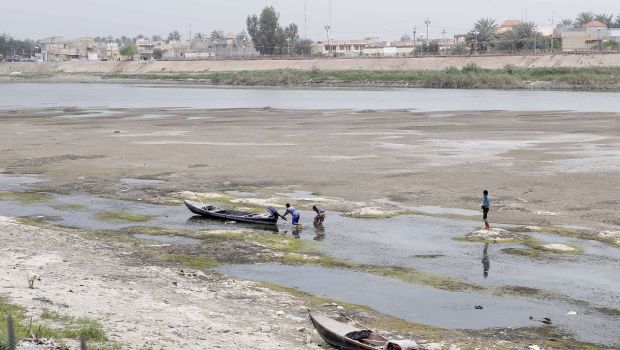
Iraqi men move a boat that was stuck on the banks of the Euphrates river in Twairij, east of Karbala, due to a decline in the water level after supplies were blocked by anti-government fighters who control access to a dam further upstream in conflict-hit Anbar province on April 8, 2014. (AFP PHOTO / MOHAMMED SAWAF)
Faris Ibrahim, a member of the pro-government tribal Anbar Awakening Council, told Asharq Al-Awsat that the official security forces were lukewarm in their pursuit of militant groups including the Islamic State of Iraq and Syria (ISIS), and that they were not acting on intelligence passed to them by tribal allies.
“The problem we faced and continue to face is that the tribes are more serious about fighting the terrorists than the army is,” he said.
Iraq’s western province of Anbar has been rocked by violence since the end of 2013, when insurgents expelled government forces from the cities of Fallujah and Ramadi.
In his weekly address on Wednesday, Maliki vowed to defeat ISIS, a day after government forces succeeded in reopening a Euphrates dam near Fallujah which had been closed by ISIS, causing water levels to fall dramatically further downstream.
In his weekly address, Maliki said: “When the insurgents cut off the water, they exploited the government’s policy, which was based on using the highest degree of restraint and discipline, relying on the promise that the sons of Fallujah and Anbar would be on the side of the armed forces who are fighting a comprehensive war on terrorism to free the city.”
The Iraqi prime minister said Al-Qaeda and ISIS were following in the footsteps of Saddam Hussein’s Ba’ath Party in attacking Iraq’s water infrastructure, which he said “drained the marshes, cut off water supplies . . . [and] killed scholars and clerics.”
But Ibrahim said that government forces had been warned of the seizure of the dam, but had failed to act, saying his group “had information that we passed on to the official authorities, but no measures were taken and the closure took place. The closure led to the flooding of many areas and shortage of water in others, especially as they [ISIS] discovered that the government was not firm in its actions against the insurgents.”
